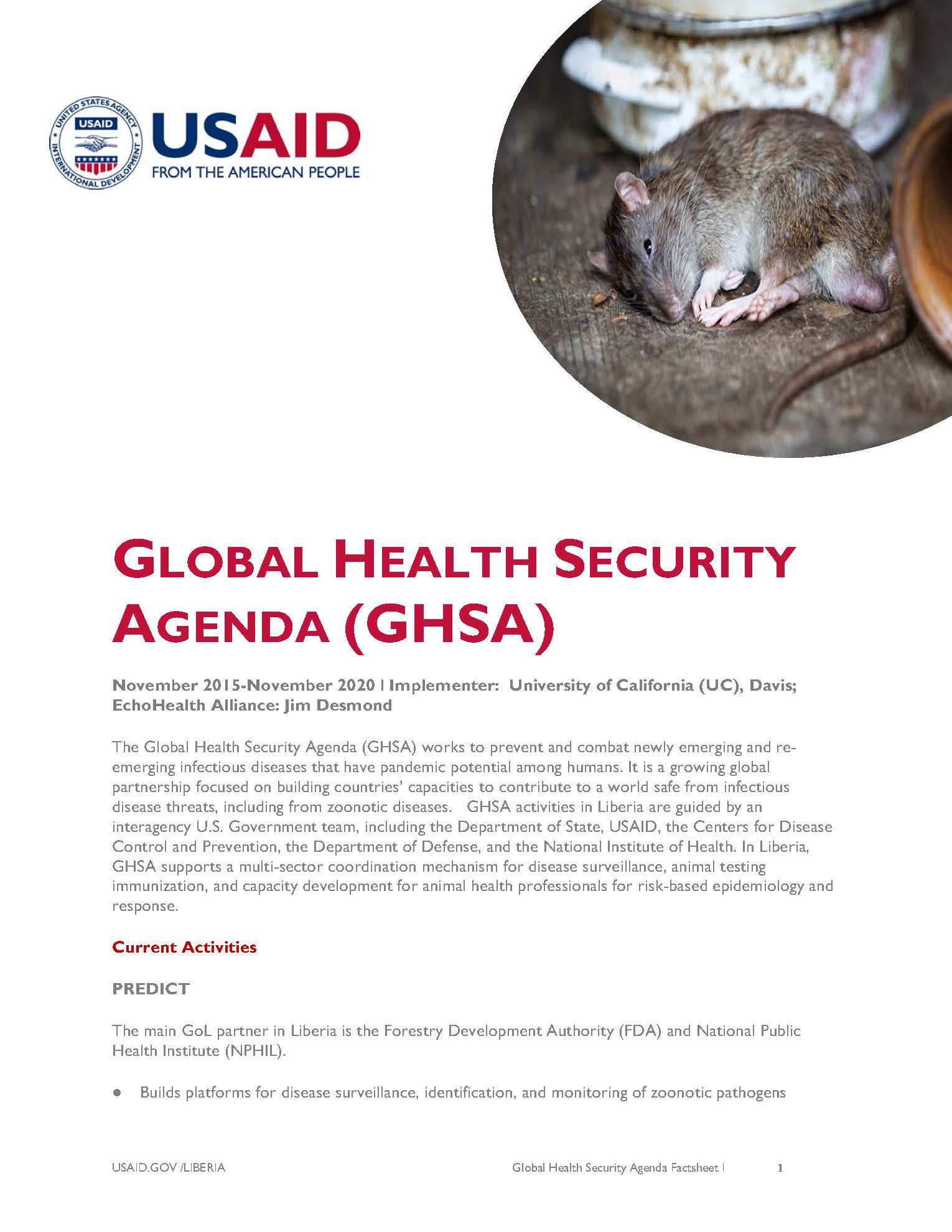Speeches Shim
GLOBAL HEALTH SECURITY AGENDA PROGRAM ![]() (pdf - 131k)
(pdf - 131k)
The Global Health Security Agenda (GHSA) works to prevent and combat newly emerging and reemerging infectious diseases that have pandemic potential among humans. It is a growing global partnership focused on building countries’ capacities to contribute to a world safe from infectious disease threats, including from zoonotic diseases. GHSA activities in Liberia are guided by an interagency U.S. Government team, including the Department of State, USAID, the Centers for Disease Control and Prevention, the Department of Defense, and the National Institute of Health. In Liberia, GHSA supports a multi-sector coordination mechanism for disease surveillance, animal testing immunization, and capacity development for animal health professionals for risk-based epidemiology and
response.
Current Activities
PREDICT
The main GoL partner in Liberia is the Forestry Development Authority (FDA) and National Public Health Institute (NPHIL).
- Builds platforms for disease surveillance, identification, and monitoring of zoonotic pathogens
- Collects data to identify animals that may serve as reservoirs of Ebola transmission hosts
- Using a One Health approach, it also works to investigate behaviors, practices, and ecological and biological factors driving disease emergence, transmission, and spread
Food and Agriculture Organization of the United Nations (FAO);
The GHSA component of the FAO program in Liberia is implemented by the Emergency Centre for
Transboundary Animal Diseases (ECTAD).
The main GoL partner in Liberia is Ministry of Agriculture (MOA)
- Using an epi-zonal approach to surveillance of major pandemic risk pathways that drive viral emergence: intensification of animal production systems and animal value chains
- Strengthening animal health laboratory capacity and networks to detect and respond to livestock and zoonotic diseases
- Completed an animal health laboratory assessment at Fendell Central Veterinary Laboratory
- Working with the Ministry of Agriculture to strengthen the Central Veterinary Laboratory and to integrate with the Ministry of Health and other laboratories
- Collecting specimens from livestock and domestic animals in collaboration with PREDICT
- Training veterinary and community animal health workers to safely collect specimens from a variety of livestock and to safely transport them to laboratories
IRC (Partnership for Advancing Community-based Services/PACS)
The goal of the GHSA IRC PACS program is to strengthen epidemic preparedness and response
activities through community surveillance/community event based surveillance (CEBS). Activities are
implemented to meet four objectives:
- Improved coordination at the national and subnational level (county-district-community);
- Enhanced integration of surveillance activities and epidemic preparedness in community health;
- Improved community level data collection, reporting and use through robust supervision and mentorship of Community Health Assistants/Volunteers (CHA/CHV); and
- Strengthen communities to reduce health risks through preparedness and prevention efforts.
Project Last Mile (PLM)
PLM serves as one of USAID’s key technical advisory Implementing Partners (IPs), directly supporting the new Central Medical Store (CMS) organization (former National Drug Store). In consultation with the CMS Director, and as guided by the USAID, PLM will develop a Detailed Consultant Implementation Plan (Inception Report) that is consistent with the broad Transition implementation strategy and as developed and mutually agreed with the MOH, NPHIL and USAID.
Whole multi-sectoral OH approach:
The OH interdisciplinary coordinated and communication approach (i.e. human, animal and environment) is designed to ensure continued surveillance, integrated laboratory analyses and result interpretation is established through monthly meetings and updates.


Comment
Make a general inquiry or suggest an improvement.